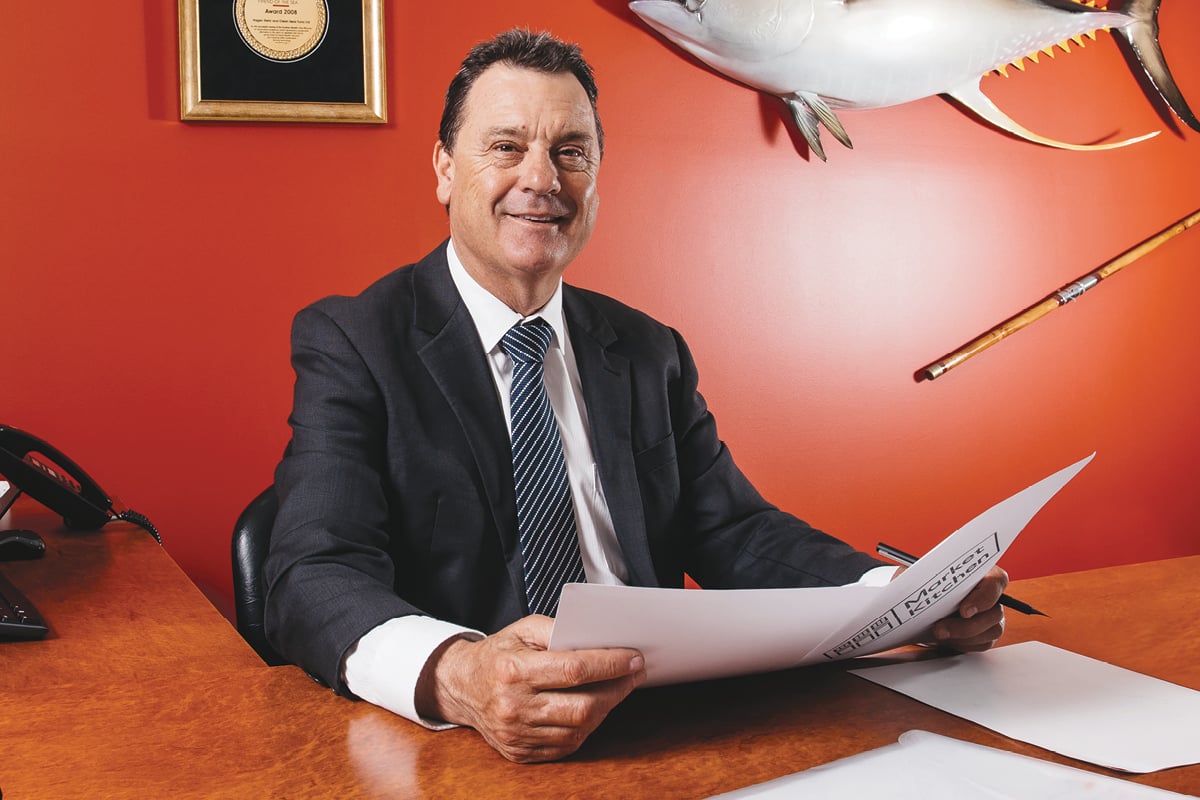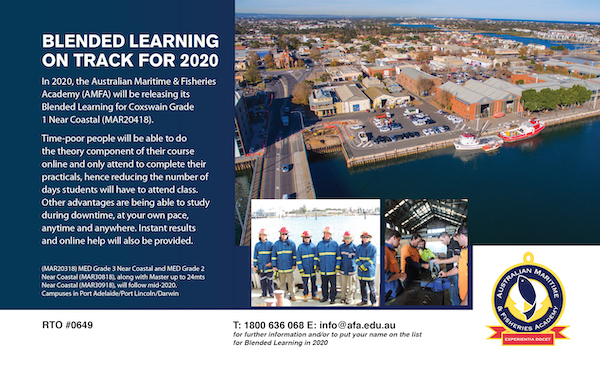Port Lincoln’s community is a tight-knit one, held together by a common interest in the sea and its bounty. The town is the hub of a dynamic fishing industry that is fiercely competitive and very much driven by family dynasties.

The Stehr name features prominently in Port Lincoln and is inextricably linked to the Australian tuna industry. The Stehr family story is a classic tale of ambition and hard work – Hagen Stehr was a German immigrant who found his way to Port Lincoln over half a century ago and became entwined in the local tuna industry, founding a fishing business dynasty that today is one of Australia’s leading fishing companies driving sustainability through aquaculture.
In 1997, Hagen’s service to education and training in the sector was recognised with an Officer of the Order of Australia award. His son Marcus now leads the Stehr Group as Managing Director.
Marcus believes he was destined to be a fisherman, after graduating from Westminster Boarding College in Adelaide. “I started fishing on the boats as a crewman, and worked my way up to First Mate. From there I gained my Skipper’s certificate, engineering certificates and diving certificates. I went right through the fishing operation. I liked that part of the business, and I was good at it,” he recalls.
Marcus also took on business studies to round out his education. “I did a postgraduate course in sales and marketing with the University of South Australia, and then my company director certificate – I’m a fellow of the Australian Institute of Company Directors.
“I’ve always had a passion for the seafood industry, and loved boats and being out on the water. I believe that if you want to be good at something you really have to have a passion for it, you have to love it,” says Marcus.
The Stehr Group is a pioneer in the tuna industry and, together with other industry pioneers, helped develop a system of catching southern bluefin tuna using the ‘purse seine’ method. Tuna is towed in pontoons to Port Lincoln, where they are held for about six months in ranching pontoons. Every fish caught has an identification tag with its weight and length recorded, and the information is collected by the Commission for the Conservation of Southern Bluefin Tuna.
In addition to the development of tuna ranching, the Stehr family founded Clean Seas Seafood, where Marcus was the inaugural Managing Director. They listed the company on the Australian Stock Exchange in 2005, and the company is still growing strong today.
“It’s been a good ride,” says Marcus enthusiastically. “As a backup to that we started farming Spencer Gulf Hiramasa Kingfish, and that’s gone extremely well for us. Over many years we’ve slowly built that business up, and today we’re the second largest shareholder in Clean Seas Seafood. I’m a director and sit on the board.”
The Stehr Group’s primary market has always been Japan, which takes about 97% of the company’s catch, but more recently it has begun to look further afield. “We’re looking at China as a new market for us, and Europe and America are other market opportunities,” Marcus says.
Business relationships are extremely important for any degree of success in the fishing industry, according to Marcus, due to the vicissitudes of growing, handling and transporting a delicate product like fish to overseas markets. “The relationships we have with our seafood customers and bankers have to be rock-solid,” he points out.
“The relationships we have with our seafood customers and bankers have to be rock-solid.”
“For example, we’ve been doing business with our Japanese customers for the past 20 years. We don’t even sign contracts – I fly to Japan or they fly down, we shake hands, they say how much fish they want, and we strike a deal. My son Saxon will be spending time in Japan learning the business with one of our main customers – that’s how close our relationships are.”
The Stehr Group lives or dies on product quality, so it adheres to strict quality management systems that screen all fish and send them through rigorous specification checks before the fish are air or sea-freighted from Port Lincoln.
“Then we’ve got different temperature regimes that we have to adhere to, but we know exactly where and when every individual fish goes to market; we know precisely the size of that fish, and whether it’s been gilled and gutted. We have an actual picture of the fish, and we know the fat condition index as well.”
Marcus Stehr – Career at a Glance
- Managing Director – Stehr Group
- Director – Clean Seas Tuna Limited
- Director – Seafood Industry Australia Board
- Executive Director – Australian Southern Bluefin Tuna Industry Association (ASBTIA)
- Member – Australian Tuna Boat Owners Association
- Member – Australian Maritime Academy Board
- Member – South Australian Marine Finfish Association (SAMFA)
- Deputy Member – Aquaculture Advisory Committee (AAC)
Marcus sees diversification as a key ingredient in the industry’s future as generational change is bringing new ideas from a younger generation of managers into play.
“Over the past 15 years we’ve sold our product as a whole, fresh or frozen, gilled and gutted fish, so I think value adding and product diversification into new markets is a great opportunity for us. Farm automation and concentrating on areas where we can get better efficiencies are key areas of interest for us.”
But the heart of the sector will always be the people on the water, says Marcus. “I think our industry is a team game. To be good in this industry you’ve got to understand all facets of it. Of course, we need good finance people and a good administrative arm in our office, but if you haven’t got the fundamentals in place – boats and the right people who want to be part of your business – you will never ever get there. You need to get out on the boat and mix it with the skippers and the crews.”
“I’ve been fishing every year for the past 30 years, so I get to see and experience, feel and touch the industry.”
Marcus delivers on his words. Every year he still goes out on boats and works with crews to see for himself the condition of the sea, the fish, the catch and the season, as all those elements change every year. “I still go out tuna fishing every year,” he says.
“I’m 54 years old; I’ve been fishing every year for the past 30 years, so I get to see and experience, feel and touch the industry, and see the fish streaming through the Great Australian Bight every year. I still feel pretty active, so I’ll keep doing it for a few more years until I can’t anymore.
“I take pride that I can be involved in most facets of the business. If we don’t get every element right in the process, we don’t get paid. It would be great if we had a crystal ball but we haven’t, so we’ve got to use all the resources available to us to make the right decisions.”
Proudly supported by:




